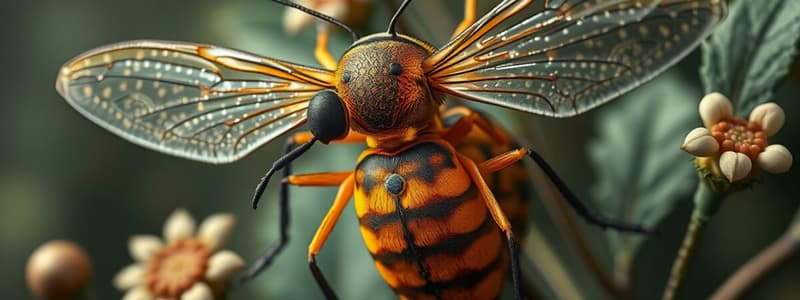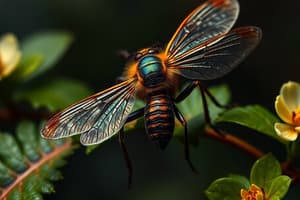Podcast
Questions and Answers
Which term describes insects that are present on crops throughout the year?
Which term describes insects that are present on crops throughout the year?
- Transient pests
- Seasonal pests
- Occasional pests
- Persistent pests (correct)
What is the study of insects related to the welfare of mankind called?
What is the study of insects related to the welfare of mankind called?
- Insect toxicology (correct)
- Insect ecology
- Insect pathology
- Entomology
What year was the insecticide act passed?
What year was the insecticide act passed?
- 1991
- 1980
- 1965
- 1972 (correct)
Which insect is controlled by the cultural method of alternate wetting and drying of rice fields?
Which insect is controlled by the cultural method of alternate wetting and drying of rice fields?
Which of the following is NOT a characteristic of attractants?
Which of the following is NOT a characteristic of attractants?
Flashcards are hidden until you start studying
Study Notes
Insect Pests and Their Management
- Persistent pests: Insects that inflict damage on crops throughout the year.
- Insect toxicology: The study of insects related to human welfare, encompassing both beneficial and harmful aspects.
Legislation and Control Methods
- Insecticide Act of 1972: Legislation governing the use of insecticides to ensure safety and efficacy.
- Cultural control methods: Techniques such as alternate wetting and drying of rice fields, specifically effective in managing the rice stem borer.
- Crop rotation: A cultural practice adopted to disrupt pest life cycles and promote soil health.
Biological Control
- NPV (Nuclear Polyhedrosis Virus): Commonly used commercial insect virus targeting lepidopteran pests.
- Zygogramma bicolorata: A biocontrol agent specifically used to combat Parthenium hysterophorus, an invasive weed.
- Cryptolaemus montrouzeri: A known predator utilized in biological pest control strategies.
Pest Management Strategies
- Legal method: The best approach to prevent the entry of foreign pests through regulations and border control.
- Attractants: Chemical substances that induce orientation movement of insects, playing a role in pest management.
Hormonal Influence
- Juvenile hormone: A naturally occurring hormone in insects that regulates development, reproduction, and metamorphosis.
Statements Review
- Understanding toxicity symbols: A green toxic symbol indicates a higher LD50 value, suggesting a more toxic chemical.
- Pollination relationships: The association between cross-pollinated crops and insects is not mutual, indicating a misunderstanding in past assessments.
Studying That Suits You
Use AI to generate personalized quizzes and flashcards to suit your learning preferences.




